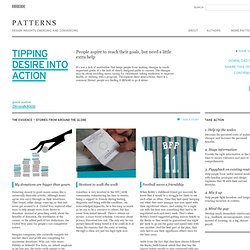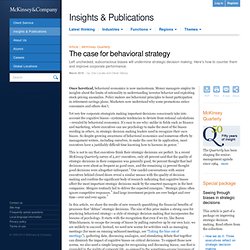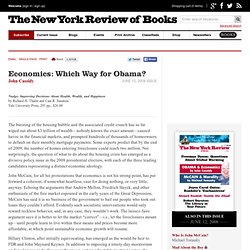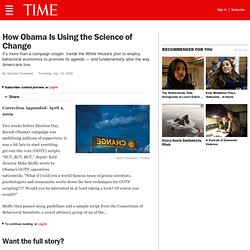

Rory Sutherland: Perspective is everything. Free exchange: Nudge nudge, think think. Tipping Desire Into Action. My donations are bigger than yours Donating money to good causes seems like a universally desirable activity.

Although many agree, few carry through on their intentions. They forget, other things come up, or they just never get around to it. United Way explored other ways to help people move from desire to donation. Instead of preaching solely about the benefits of donation, the worthiness of the causes, or the added perk of tax deductions, the United Way aims for people’s raw competitive nature. Imagine companies who naturally compete for market share and profit also competing for maximum donations. Hesitant to walk the walk Jonathan is very involved in the HIV/AIDS community, volunteering his time to events, being a support to friends during testing, diagnosis and living with the condition. Football saves a friendship When Bobby’s childhood friend got married, he knew that it would be a struggle for them to see each other as often. Recycling. » Choice Architecture. » Blog Archive » Behavioral Economics 101: Dinner Party Applicat.
Applied Behavioral Economics. The case for behavioral strategy - McKinsey Quarterly - Strategy. Once heretical, behavioral economics is now mainstream.

Money managers employ its insights about the limits of rationality in understanding investor behavior and exploiting stock-pricing anomalies. Policy makers use behavioral principles to boost participation in retirement-savings plans. Marketers now understand why some promotions entice consumers and others don’t. Yet very few corporate strategists making important decisions consciously take into account the cognitive biases—systematic tendencies to deviate from rational calculations—revealed by behavioral economics. It’s easy to see why: unlike in fields such as finance and marketing, where executives can use psychology to make the most of the biases residing in others, in strategic decision making leaders need to recognize their own biases.
This is not to say that executives think their strategic decisions are perfect. The value of good decision processes Exhibit 1 The research analyzed a variety of decisions. Enlarge Exhibit 2 Pop out. Behavioural economics. Economics: Which Way for Obama? - The New York Review of Books. Nudge: Improving Decisions About Health, Wealth, and Happiness by Richard H.

Thaler and Cass R. Sunstein Yale University Press, 293 pp., $26.00 The bursting of the housing bubble and the associated credit crunch has so far wiped out about $3 trillion of wealth—nobody knows the exact amount—caused havoc in the financial markets, and prompted hundreds of thousands of homeowners to default on their monthly mortgage payments. John McCain, for all his protestations that economics is not his strong point, has put forward a coherent, if somewhat heartless, case for doing nothing, or very little, anyway. Hillary Clinton, after initially equivocating, has emerged as the would-be heir to FDR and John Maynard Keynes.
Barack Obama has also criticized McCain for sitting back and watching while so many American families face eviction. If Obama isn’t an old-school Keynesian, what is he? Thaler’s columns, some of which he coauthored with Kahneman and Tversky, ran under the rubric “Anomalies.” How Obama Is Using the Science of Change. Correction Appended: April 2, 2009 Two weeks before Election Day, Barack Obama's campaign was mobilizing millions of supporters; it was a bit late to start rewriting get-out-the-vote (GOTV) scripts.

"BUT, BUT, BUT," deputy field director Mike Moffo wrote to Obama's GOTV operatives nationwide, "What if I told you a world-famous team of genius scientists, psychologists and economists wrote down the best techniques for GOTV scripting?!?! Would you be interested in at least taking a look? Of course you would!! " Moffo then passed along guidelines and a sample script from the Consortium of Behavioral Scientists, a secret advisory group of 29 of the... Behavioral economics summit for startups. How Companies Learn Your Secrets. Design’s Next Frontier: Nudging Consumers Into Making Better Life Choices. The following is adapted from an Artefact white paper.

The full version may be downloaded here. Recent advances in neuroscience and behavioral economics, cognitive psychology and anthropology are helping us better understand how our brains work and how decision-making takes place. A core finding of this work is that we are not primarily the products of our conscious thinking; we are instead the products of thinking that happens below the level of awareness.
Reason, it turns out, is highly dependent on emotional value judgments and therefore is highly susceptible to bias. This is a departure from the conventional wisdom of 20th-century economists and policy makers who tended to think of people as rational creatures who would weigh their options and make rational decisions. Now we are starting to amass a body of evidence built from hundreds of scientific studies documenting dozens of human cognitive biases. Designers have been influencing behavior for a long time.